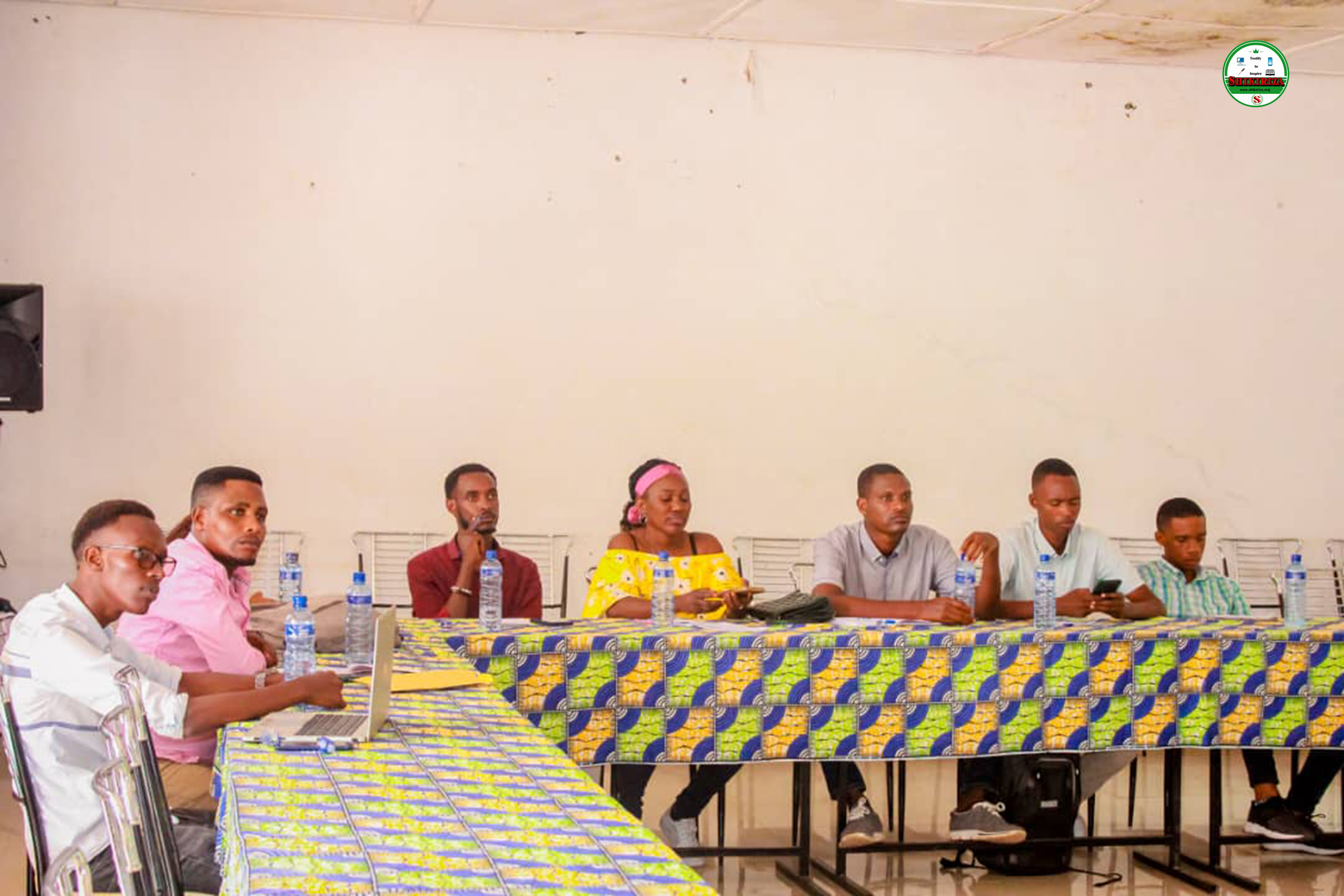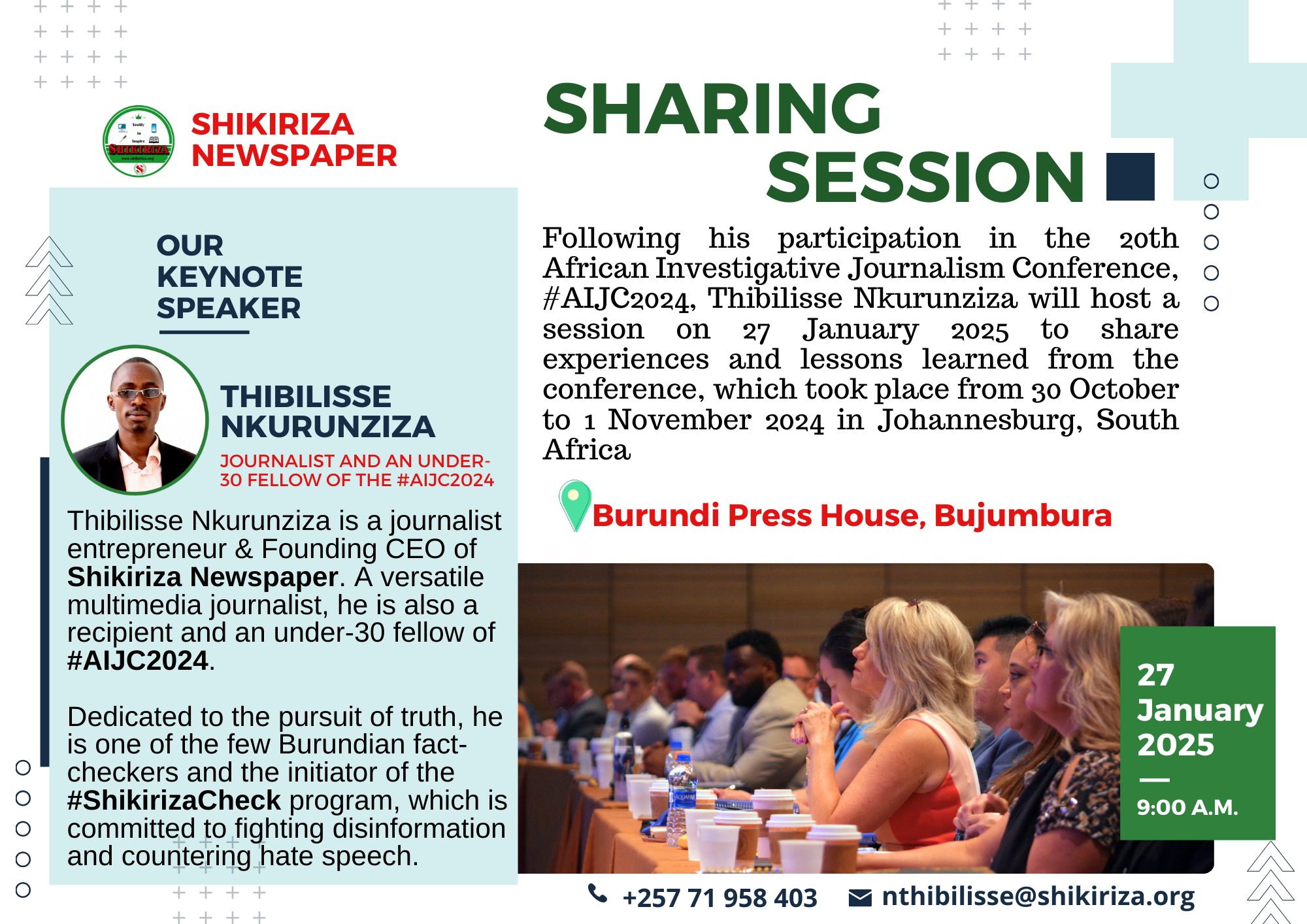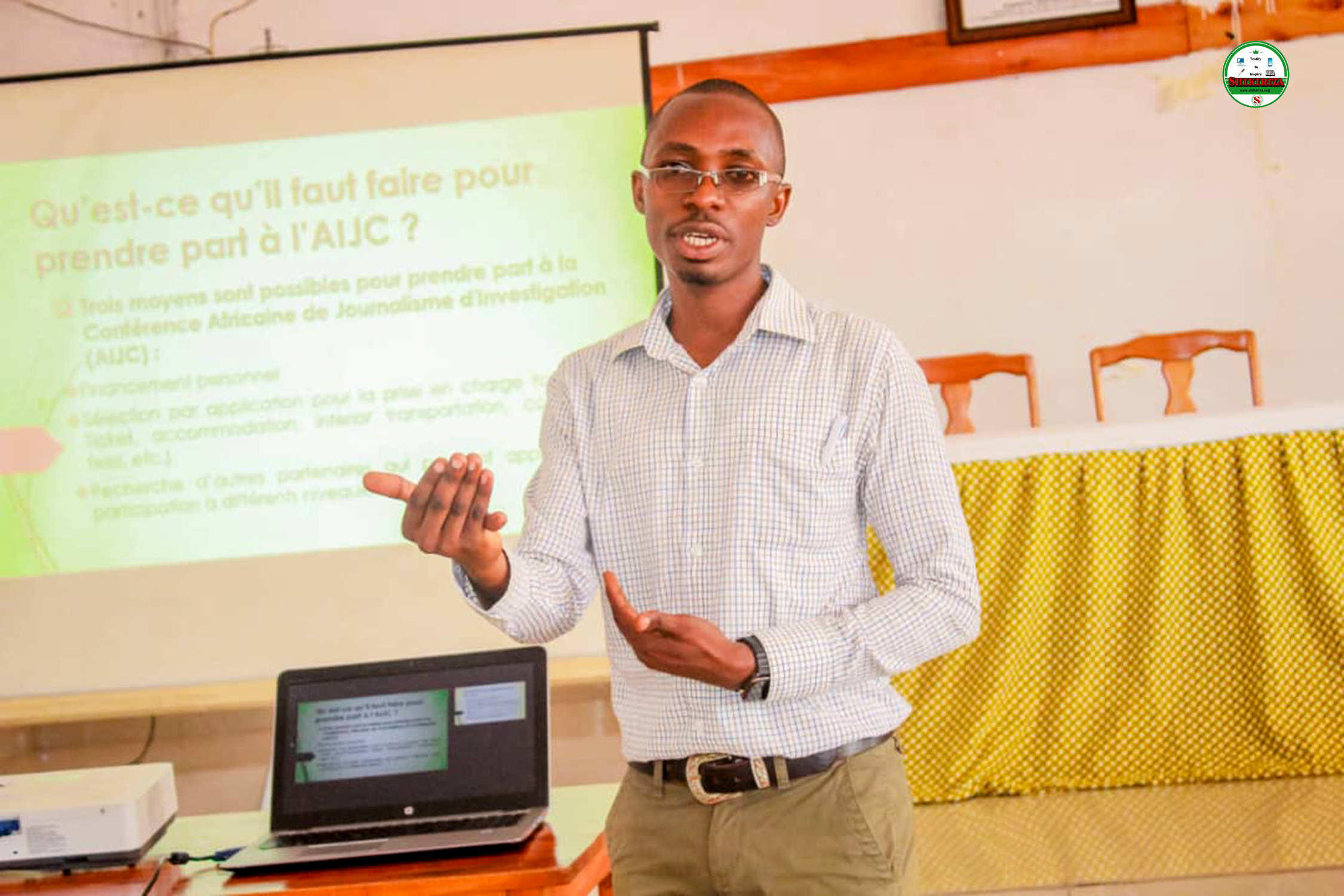Two months after attending the 20th African Investigative Journalism Conference (#AIJC2024), Thibilisse Nkurunziza, the founder and editor-in-chief of Shikiriza newspaper and an under-30 fellow of #AIJC2024, successfully organized and led a session to share the experiences and lessons he gained. The conference took place in Johannesburg, South Africa, from October 30 to November 1, 2024.
According to Thibilisse Nkurunziza, the session was an opportunity to inspire his fellow Burundian journalists working in different media outlets. It also allowed him to give back to the community, apply what he had learned in collaboration with his colleagues, and share insights on how to rethink and reform journalism in Burundi.
The 20th African Investigative Journalism Conference, held from October 30 to November 1, 2024, brought together professionals from across Africa and beyond. Burundi was represented by three journalists, including Thibilisse Nkurunziza, the founding director of Shikiriza newspaper and an under-30 fellow at #AIJC2024.
Reflecting on his experience, Thibilisse Nkurunziza said that his time in Johannesburg, alongside senior investigative journalists and other media professionals, was transformational. It inspired him, challenged his thinking, and motivated him to pursue and initiate changes in his journalistic career.
“It was my first time attending a conference like this, where professionalism and passion for journalism come together,” Thibilisse said, speaking about his experience at #AIJC2024.
“The training workshops, panels, and knowledge-rich debates, alternated with networking sessions, where I exchanged contacts, ideas, and experiences with renowned journalists,” he added.
He described #AIJC2024 as more than just an event, calling it an educational and transformational experience.
“I met people I had known from major international media, and I was able to engage with them. Surprisingly, I found them to be so friendly, humble, and collaborative. Despite my lesser experience and recognition, they didn’t look down on me, » Thibilisse Nkurunziza recalled with admiration.
The genesis of the session held on 27 January 2024

“After attending #AIJC2024, I felt indebted to the entire Burundian media community,” said Thibilisse
According to Thibilisse Nkurunziza, the idea behind the session he organized on January 27, 2024, at the Burundi Press House, which brought together approximately thirty journalists under the age of 30 from different Burundian media, did not come out of the blue. He explained that for years, whenever he learned something, especially from training workshops or conferences, he made an effort to implement it or share it with others.
“In 2019, when I was still at university, I received training on the effective use of social media and blogging. I began hosting workshops to teach my fellow students about the efficient use of social media, in collaboration with the local youth-led organization, AJAP. In 2020, I got trained in multimedia and audiovisual production. I then initiated a youth and women’s theater group that created video skits about the fight against tuberculosis. I filmed and edited these videos myself,” Thibilisse Nkurunziza explained.
“By the end of 2020, I discovered my passion for blogging and journalism, so I pursued journalistic writing training. Eventually, I combined the skills from my 2019 training with multimedia knowledge and journalistic writing skills to launch an online media outlet that focuses primarily on issues affecting children, youth, women, and other vulnerable and underrepresented groups. This is how Shikiriza newspaper was born, and it continues to contribute to the media and communications sector in Burundi with initiatives that resonate well with the Burundian public,” Thibilisse Nkurunziza said, reflecting on his journey.
“In 2022, I completed a course in fact-checking. Subsequently, I trained my colleagues at Shikiriza Newspaper on this subject and initiated the #ShikirizaCheck program. This initiative, under the Shikiriza newspaper’s umbrella, is dedicated to combating disinformation and countering hate speech,” he added.

“#AIJC is more than just an event. It is, in fact, a transformational experience,” testified Thibilisse
Thibilisse Nkurunziza felt a strong responsibility to share the knowledge and insights he gained from the inspiring and experience-rich community he encountered at the African Investigative Journalism Conference held at Wits University in Johannesburg, as he noted.
“My motivation is both clear and sincere: to offer a significant contribution to the realm of journalism, a profession for which I have the utmost admiration and respect,” he stated.
“After attending #AIJC2024 as an under-30 fellow, I felt indebted to my fellow young journalists and the entire Burundian media community. That’s when I decided to share what I gained at the conference with others,” Thibilisse Nkurunziza explained.
“To begin implementing what I’ve learned, I also thought about creating a network of young journalists committed to combating disinformation and countering hate speech. We named it ‘REJADEME’ in French acronym,” he concluded.
What is REJADEME?

“I hope that REJADEME will succeed in its mission,” stated Thibilisse Nkurunziza confidently
REJADEME, a French acronym standing for Réseau des Jeunes Journalistes Actifs contre la Désinformation et la Propagation des Messages de Haine (Network of Young Journalists Committed to Combating Disinformation and Countering Hate Speech), is a group of passionate young journalists and fact-checking practitioners in Burundi.
“Burundi is one of the few, if not the only, countries in the sub-region without a network of professional fact-checkers. However, it is one of the countries where disinformation and hate speech are rampant, especially on social media and within the community. Burundi has also experienced significant disruptions in investigative and general journalism,” Thibilisse Nkurunziza explained.
“In 2015, Burundi went through a severe political crisis, which affected many sectors, including the media. As many know, several independent media were either burned down or forced to close, and over 100 journalists fled the country. Those who remained inside the country self-imposed self-censorship, leaving some topics uncovered for fear of prosecution, violence, or abduction,” he added.
This network, he explained, was created to explore ways to rethink and reform the Burundian journalism landscape through the new generation of journalists. It also aims to contribute to media literacy and combat disinformation and the proliferation of hate speech, particularly in the lead-up to the 2025 and 2027 elections. Additionally, the network seeks to support the government’s efforts to improve the media sector, as Thibilisse Nkurunziza emphasized.
“Since President Evariste Ndayishimiye’s election in 2020, there has been a noticeable shift toward supporting the Burundian media sector, with his slogan #JamaisSansMédias (Never Without Media),” Thibilisse Nkurunziza added.
Thibilisse Nkurunziza hopes the network, which currently includes 31 journalists from various public and private media outlets in Burundi, will thrive. He calls for technical, moral, material, and financial support from anyone who cares about a free, inclusive, competent, transformative, and impactful press.

